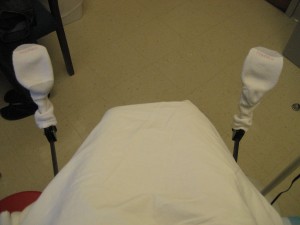Here's what the American College of Obstetricians and Gynecologists (ACOG) says about the pelvic exam, after recommending it be done annually:
No evidence supports or refutes the annual pelvic examination or speculum and bimanual examination for the asymptomatic, low-risk patient. An annual pelvic examination seems logical, but also lacks data to support a specific time frame or frequency of such examinations.
Just take a minute with that. Women get them annually, even though we "lack data" that they do much for us.
Then there's the "bi-manual exam" part of the pelvic exam. That's where a doctor palpates a woman's ovaries, in part to screen for ovarian cancer. But ACOG writes that the test has "low sensitivity" for finding masses in the ovaries.
Still with me? Anyone wondering why women are getting a bi-manual exam every year?
None of this should be news to doctors. But a new survey from UCSF shows that it is. Researchers surveyed 521 OB/GYNS across the country to assess why doctors were doing the exam. Nearly all doctors surveyed said they would perform the bi-manual screen on healthy, asymptomatic women. And here's the kicker: nearly half said they were performing the bi-manual exam to screen for ovarian cancer.
Professor Jillian Henderson performed the research while at UCSF. (She's now at the Kaiser Permanente Center for Health Research in Portland.) "We think we're getting the exam to be told that everything's OK," she told me in an interview. "But if it's not good at detecting one of the main cancers that we think that it's telling us we're OK about, we're falsely reassured."
There were other caveats too. In the survey researchers asked doctors about varying types of patients, including 18-year-olds. ACOG recommends the bi-manual exam start at age 21, but 87 percent of doctors surveyed said they would perform the exam on the 18-year-old.
Henderson was also troubled that some doctors said they would also require a woman who wanted the birth control pill to have a pelvic exam, again, despite guidelines that say it is not necessary. This creates a barrier to accessing birth control.
Henderson was clear that their survey was not all encompassing, pointing out that there may be reasons for the annual checkup that were not captured in the survey. "Sometimes women want to talk to a specialist about the reproductive organs and body and sexual health," she said.
In fairness to doctors, about 80 percent of respondents said that patients expected the test. Women probably do, pointing out that we need more information. "We need to understand a little more about what women gain from this exam and whether they really want to have this exam," Henderson says, "even if it doesn't have a strong role in preventing cancer."
On a different note, about half of doctors said it was important to do the test to "ensure adequate compensation." But this is not necessarily about greed, it's also a reality of the way health care is reimbursed in this country. "We have a health care system that funds the examinations you conduct," Henderson said. "I think we do need to shift toward looking at ways to fund women's contacts with health care providers that they value highly even if it's just discussions that are taking place."
While we're waiting for that to happen, you might want to talk with your doctor if you don't feel a need to have the bi-manual exam or any other part of the pelvic examination.
Learn More
Questioning the Pelvic Exam (New York Times)
